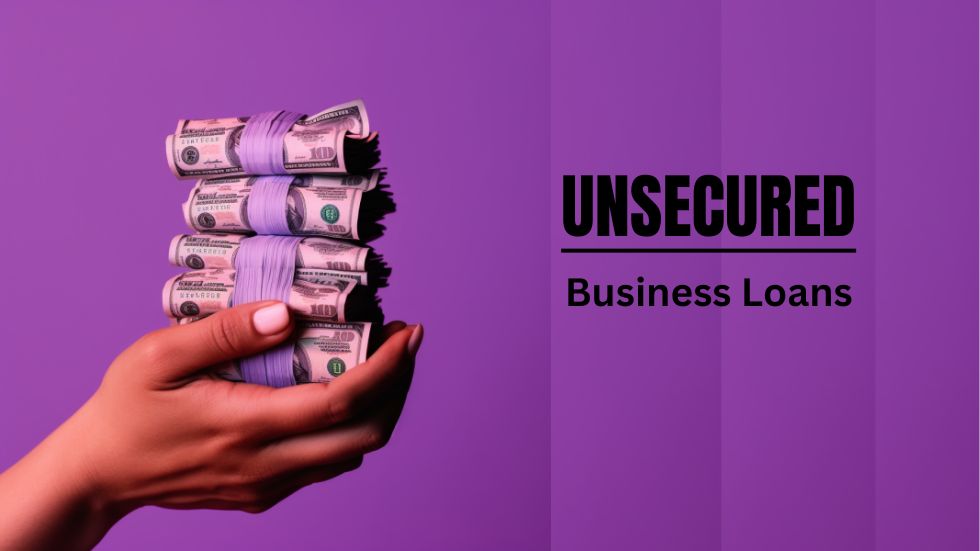A business loan that doesn’t need any kind of asset or property as protection is called “unsecured.” For protected loans, on the other hand, things like land, tools, or stock are used as security. Unsecured loans are given out based on the borrower’s credit history and how strong the business is thought to be.
In an unsecured business loan, the investor looks at the borrower’s credit background, financial records, company plan, and other relevant factors to decide if the borrower can pay back the loan. Most of the time, the loan is given based on the borrower’s personal and business credit, as well as the business’s financial health.
It can be hard to get an uninsured business loan for a number of reasons:
Higher risk for lenders:
Unsecured loans don’t need security, so if the client doesn’t pay back the loan, the lender has nothing to lose. Because the investor is taking on more risk, they are more likely to lose money. Because of this, lenders tend to have tighter standards and more thorough reviews to lower the amount of risk they are subject to.
Creditworthiness assessment:
Lenders heavily rely on the creditworthiness of the borrower when considering unsecured loans. They look at the borrower’s personal and business credit scores, payment records, and financial documents to see if they can pay back the loan. If you don’t have a great credit history or if your business doesn’t have much credit history, it can be harder to get an uninsured loan.
Limited financial documentation:
Unsecured loans often require a detailed understanding of the borrower’s financial situation, including revenue, cash flow, and profitability. Without security, lenders use this information to figure out whether or not the user can pay back the loan. If your business is new or you don’t have a lot of good financial paperwork, it can make it harder to get a loan.
Smaller loan amounts:
When compared to protected loans, most unsecured loans are for smaller amounts. Lenders may prefer bigger loans with collateral because it gives them more protection. If you need a big loan, getting an uninsured loan might be harder.
Conditions in the market and the policies of lenders:
Conditions in the market and the policies of lenders can affect the supply and rates of unprotected loans. When the economy is unclear or credit markets are tight, lenders may be less willing to take chances and limit their risky loans. Also, every lender has its own risk tolerance and screening standards, which can make it even harder to get an uninsured loan.
There are still ways to get an uninsured business loan, even though these problems exist.
Here are some ways to get unprotected loans for your business:
Get pre-approved:
Before you try to get a loan, get pre-approved by a lender. This will help you figure out how much money you can borrow and how much interest you’ll have to pay.
Have a good business plan:
Lenders want to know you have a good business plan and are likely to succeed. Your business plan should include your financial forecasts, your marketing plan, and a study of your competitors.
Show that you have good credit:
If you have good credit, be sure to say so on your loan application. You can also send a copy of your credit report to the company.
Have assets:
If you have any assets, make sure to list them all on your loan application. This will show the investor that if you can’t pay back the loan, you have a plan B.
Conclusion
To improve your chances of getting an uninsured business loan, you should keep your credit score high, have a good business plan, and provide a lot of financial documents. You could also look for lenders who specialize in uninsured business loans or look into other ways to get money, such as crowdfunding or business credit cards.
FAQs
- Can I obtain an unsecured business loan with bad credit?
- While it can be challenging, some lenders specialize in providing unsecured business loans to borrowers with less-than-perfect credit. However, you may need to provide additional guarantees or accept higher interest rates.
- Are there any government programs that offer unsecured business loans?
- Yes, certain government programs, such as Small Business Administration (SBA) loans, offer unsecured financing options for eligible businesses. These programs often have specific requirements and may require collateral or personal guarantees.
- How long does the approval process for an unsecured business loan typically take?
- The approval process can vary depending on the lender and the complexity of your application. It can range from a few days to several weeks. It is advisable to prepare all necessary documentation and provide accurate information to expedite the process.
- What is the difference between secured and unsecured business loans?
- Secured business loans require collateral to secure the loan, while unsecured loans do not. Secured loans offer lower interest rates and higher loan amounts but require specific assets to be pledged as security.
- Are there any specific industries that face more challenges in obtaining unsecured business loans?
- Certain industries, such as startups, high-risk ventures, or those with inconsistent revenue streams, may face more challenges in obtaining unsecured business loans due to perceived risk factors. However, each lender evaluates applications on a case-by-case basis.

